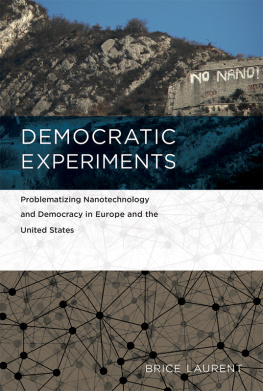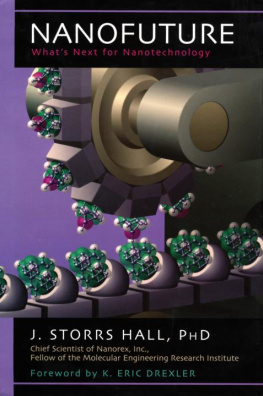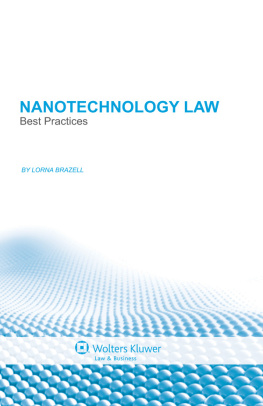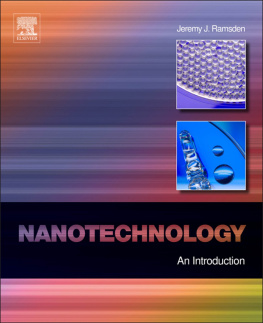2017 Massachusetts Institute of Technology
All rights reserved. No part of this book may be reproduced in any form by any electronic or mechanical means (including photocopying, recording, or information storage and retrieval) without permission in writing from the publisher.
This book was set in Stone Sans and Stone Serif by Toppan Best-set Premedia Limited. Printed and bound in the United States of America.
Library of Congress Cataloging-in-Publication Data
Names: Laurent, Brice, author.
Title: Democratic experiments : problematizing nanotechnology and democracy in Europe and the United States / Brice Laurent.
Description: Cambridge, MA : MIT Press, [2017] | Series: Inside technology | Includes bibliographical references and index.
Identifiers: LCCN 2016028724 | ISBN 9780262035767 (hardcover : alk. paper)
eISBN 9780262035767
Subjects: LCSH: Nanotechnology--Political aspects--European Union countries. | Nanotechnology--Political aspects--United States. | Nanotechnology--Government policy--European Union countries. | Nanotechnology--Government policy--United States. | Science and state--European Union countries. | Science and state--United States. | Democracy--European Union countries. | Democracy--United States.
Classification: LCC T174.7 .L379 2017 | DDC 338.94/06dc23 LC record available at https://lccn.loc.gov/2016028724
ePub Version 1.0
Acknowledgments
This book has been developed over the past few years, while I was a PhD candidate and then a permanent researcher at the Center for the Sociology of Innovation (CSI) of Mines ParisTech. CSI has been an extremely stimulating and friendly environment, and I thank all of its members for the support they provided. Among them, Michel Callon holds a special place. He was an irreplaceable guide in my first encounters with sociology and, later, in the development of this work. He has been a thoughtful, open-minded, and stimulating mentor, eager to help me develop new trains of thoughts.
Sheila Jasanoff welcomed me as a fellow in the Program on Science, Technology & Society (STS) of the Kennedy School of Government at the early stages of this research and a few years later, as it developed from the PhD thesis it had become. She has been a constant support and a permanent source of inspiration. I am grateful for all I have received from her, including the possibility to participate in the annual discussions of the Science and Democracy Network. These meetings have been fruitful sites for presenting and discussing many of the themes and arguments that are developed in this book.
I developed some of the ideas presented in this book from (or alongside) papers published in academic journals or collective volumes. My initial empirical explorations in Grenoble led to a paper published in Innovation (Brice Laurent, Diverging Convergences: Competing Meanings of Nanotechnology and Converging Technologies in a Local Context, Innovation: The European Journal of Social Science Research 20, no. 4 [2007]: 343357), which I used to develop part of chapter 6. I initiated the analysis of the political questions related to the definitions of nanomaterials in a 2013 paper (Brice Laurent, Les espaces politiques des substances chimiques: Dfinir des nanomatriaux internationaux, europens et franais, Revue danthropologie des connaissances 7, no. 1 [2013]: 195221), which provided some of the first elements from which I wrote chapter 4. I presented the analysis of OECD as a site where international expertise and public engagement were problematized (as discussed in chapters 3 and 7) in a chapter written for a collective volume (Brice Laurent, Boundary-Making in the International Organization: Public Engagement Expertise at the OECD, in Jan-Peter Vo and Richard Freeman, eds., Knowing Governance: The Epistemic Construction of Political Order [London: Palgrave, 2015], 217235).
I owe a lot to the coauthors of some of the papers from which I developed sections of this book. I started a reflection on the critical engagement of the social scientist in nanotechnology with Michiel van Oudheusden, as we worked on a paper published in 2013 (Michiel van Oudheusden and Brice Laurent, Shifting and Deepening Engagements: Experimental Normativity in Public Participation in Science and Technology, Science, Technology & Innovation Studies 9, no. 1 [2013]: 121). This was extremely helpful to work on chapter 7 of this book. I discussed the case of the French national debate on nanotechnology in a paper written with Vra Ehrenstein, in which we compared two state experiments with public participation, in France and the Democratic Republic of the Congo (Vra Ehrenstein and Brice Laurent, State Experiments with Public Participation: French Nanotechnology, Congolese Deforestation and the Search for National Public, in Rethinking Participation: Science, Environment and Emergent Publics, ed. Jason Chilvers and Matthew Kearnes, 123143 [London: Routledge, 2015]). Thinking of the French example in those experimental terms helped me develop some of the arguments presented in chapters 3 and 7 of this book. Henri Boullier and I characterized a European mode of public reasoning as a regulatory precaution (Henri Boullier and Brice Laurent, La prcaution rglementaire: Un mode de gouvernement europen des objets techniques, Politique Europenne 3, no. 49 [2015]: 3053), which helped me analyze some of the European examples discussed in the book (chapters 4 and 7). The reflections I have been conducting with Jim Dratwa were helpful in considering responsibility as an operator that organizes the European political, economic, and moral space (as presented in chapter 5)a perspective that I developed for this book alongside a chapter written for a collective volume published in 2016 (Brice Laurent, Perfecting European Democracy: Science as a Problem of Technological and Political Progress, in Perfecting Human Futures: Technology, Secularization and Eschatology, ed. Benjamin Hurlbut and Hava Tirosh-Samuelson, 217238 [Dordrecht: Springer, 2016]). I benefited from support from the Transhumanist Imagination project directed by Ben Hurlbut and Hava Tirosh-Samuelson when I worked on this latter chapter, and on the corresponding sections of this book.
As I sought to build on Science and Technology Studies to reflect on the politics of governmental action, I benefited from numerous exchanges with a group of scholars interested in technologies of participation, including Jason Chilvers, Ulrike Felt, Jan-Peter Vo, Linda Soneryd, and Sonja van der Arendt. They helped me undertake a more thorough reflection on political experiments, which directly contributed to the study of technologies of democracy presented in this book.
The editors of collective volumes who invited me to contribute to their projects have been very helpful as I developed some of the arguments presented in this book. I thank Jason Chilvers, Ben Hurlbut, Matthew Kearnes, Richard Freeman, and Jan-Peter Vo.
As friends and demanding researchers, Nicolas Benvegnu, Stve Bernardin, Benjamin Lemoine, and Liliana Doganova played a central role in my research approach for this book and helped me develop and clarify some of its arguments.
Understanding the democratic questions that nanotechnology raises required collaborating with many people directly involved in its problematization. I am grateful to the people with whom I discovered this unusual field, and particularly to the members of Vivagora and of the nanotechnology working group at the French standardization organization (AFNOR), and participants in the Working Party on Nanotechnology at the OECD. I thank the researchers of the Center for Nanotechnology in Society at Arizona State University and particularly David Guston, who welcomed me at the Center for Nanotechnology in Society (CNS) as a visiting scholar, and Erik Fisher, with whom the conversations about his projects and about nanotechnology policy in general have been fruitful.













